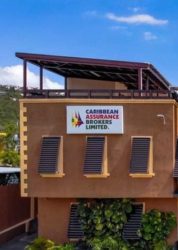 The Junior Market lost ground on Monday as the market index fell 26.30 points to end at 3,195.95 as declining socks just edged out advancing ones.6 to 5. Volume traded suffered a 66 percent reduction and the value of stocks trading dropped 63 percent, compared to trading on Friday.
The Junior Market lost ground on Monday as the market index fell 26.30 points to end at 3,195.95 as declining socks just edged out advancing ones.6 to 5. Volume traded suffered a 66 percent reduction and the value of stocks trading dropped 63 percent, compared to trading on Friday.
The junior Market closed with 18 securities versus 23 on Friday leading to only 500,614 units valued at $2,920,659 trading compared with 1,459,166 units valued at $7,939,041 on Friday.
Trading closed with 6 stocks having higher bids than their last traded prices and 5 closing with lower offers.
The Junior Market ended trading with an average of just 28,812 units for an average value of $162,259 compared to 63,442 units for an average value of $345,176 on Friday. In contrast, June closed with averages of 395,969 units valued at $1,799,200 for each security traded.
 At the close of the market, stocks trading and their last traded price are: AMG Packaging closed at $4.05 with a mere 594 units changing hands, Cargo Handlers traded 8,204 shares and fell 9 cents to $15.90, Caribbean Producers gained 19 cents in trading only 373 shares to close at $3.69, C2W Music traded 6,000 shares to close at 43 cents, Derrimon Trading ended at $8.05 with 11,912 shares changing hands, Dolphin Cove dropped $3 and ended at $17 with 753 shares trading, Eppley jumped 95 cents and closed with 6,000 units, changing hands at $12.95 General Accident fell 35 cents and closed trading with 500 shares at $3, ISP Finance gained 50 cents to end at $18.50 with 14,547 units changing hands. Jamaican Teas traded 49,146 shares, to end at $4.20,
At the close of the market, stocks trading and their last traded price are: AMG Packaging closed at $4.05 with a mere 594 units changing hands, Cargo Handlers traded 8,204 shares and fell 9 cents to $15.90, Caribbean Producers gained 19 cents in trading only 373 shares to close at $3.69, C2W Music traded 6,000 shares to close at 43 cents, Derrimon Trading ended at $8.05 with 11,912 shares changing hands, Dolphin Cove dropped $3 and ended at $17 with 753 shares trading, Eppley jumped 95 cents and closed with 6,000 units, changing hands at $12.95 General Accident fell 35 cents and closed trading with 500 shares at $3, ISP Finance gained 50 cents to end at $18.50 with 14,547 units changing hands. Jamaican Teas traded 49,146 shares, to end at $4.20,  Jetcon Corporation fell 14 cents and ended at $5.35 with 349,980 shares trading, KL E Group traded 30,000 shares to end at $2.10. Knutsford Express traded 3,700 shares but lost 70 cents to end at $15. Lasco Distributors ended at $7 after trading 2,350 units, Lasco Financial gained 5 cents with 100 shares changing hands, to end at $3.80, Main Event jumped 75 cents and ended trading 6,242 shares at $6, Paramount Trading lost 2 cents to end at $3 with 5,973 units trading and tTech ended with 2,623 units changing hands to close at $7.80.
Jetcon Corporation fell 14 cents and ended at $5.35 with 349,980 shares trading, KL E Group traded 30,000 shares to end at $2.10. Knutsford Express traded 3,700 shares but lost 70 cents to end at $15. Lasco Distributors ended at $7 after trading 2,350 units, Lasco Financial gained 5 cents with 100 shares changing hands, to end at $3.80, Main Event jumped 75 cents and ended trading 6,242 shares at $6, Paramount Trading lost 2 cents to end at $3 with 5,973 units trading and tTech ended with 2,623 units changing hands to close at $7.80.
In other news, another Junior Market listing is set to hit the market in July, this one will be a big hit with investors, with a low offer price in the region of $2 and historical PE of 8 times 2016 earnings and an even lower PE, based on 2017 earnings, with revenues growing around 20 percent. IC Insider.com will provide a full update very soon.
Archives for July 2017
One Caribbean Media takes 91% of trade
 One Caribbean Media dominated market activity Trinidad & Tobago Stock Exchange on Monday with 91 percent of both the 1,204,518 units traded and the value of $18,120,647 traded. Monday’s trading compared to Friday’s 2,080,937 units valued at $4,909,138.
One Caribbean Media dominated market activity Trinidad & Tobago Stock Exchange on Monday with 91 percent of both the 1,204,518 units traded and the value of $18,120,647 traded. Monday’s trading compared to Friday’s 2,080,937 units valued at $4,909,138.
Trading resulted in 14 securities changing hands compared to 15 on Friday and at the close on Monday, 4 stocks advanced, 3 declined and 7 were unchanged.
The Composite Index gained 0.07 points to 1,209.25, the All T&T Index lost 0.10 points to 1,790.94 and the Cross Listed Index rose 0.03 points to close at 84.09.
IC bid-offer Indicator| The Investor’s Choice bid-offer ended with 4 stocks with bids higher than last selling prices and 7 with lower offers.
Gains| Clico Investment closed at $22.51, gaining 1 cent with 12,000 shares traded, National Enterprises added 1 cent, closing at $10.50 with an exchange of 650 units, One Caribbean Media traded 1 cent higher to close at $15.01, exchanging 1,093,186 shares valued at $16,408,722 and 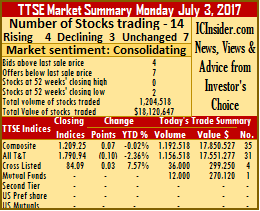 Scotia Investments closed at $2, with gains of 4 cents trading 1,000 units.
Scotia Investments closed at $2, with gains of 4 cents trading 1,000 units.
Losses| Angostura Holdings closed at $15, losing 1 cent with an exchange of 7,772 shares, Massy Holdings lost 1 cent to close at a 52 weeks’ low of $49.99, with 5,360 shares changing hands and National Flour Mills closed at a 52 weeks’ low of $2.20, with a loss of 9 cents trading 1,500 shares.
Firm Trades| Ansa Merchant Bank exchanged 6,800 shares at $40, Berger Paints closed at $4.05, with trades of 2,551 units, Prestige Holdings traded 200 units at $10.74. Sagicor Financial closed at $8.50, exchanging 35,000 units, Scotiabank remained at $58.01, with 5,615 shares valued at $325,700 trading, Trinidad & Tobago NGL exchanged just 87 units at $21.90 and Trinidad Cement closed at $4.14, with 32,797 shares changing hands.
Radio Jamaica looks promising
 Radio Jamaica generated revenues of $1.2 billion in the March 2017 quarter, $156 million less than the December quarter but had $49 million more in direct expenses in the March quarter when it was expected that direct expenses would have fallen in keeping with the reduced income.
Radio Jamaica generated revenues of $1.2 billion in the March 2017 quarter, $156 million less than the December quarter but had $49 million more in direct expenses in the March quarter when it was expected that direct expenses would have fallen in keeping with the reduced income.
The group also reported lower profits in the March quarter compared with the December quarter and suffered a loss before taxation of $30 million and $65 million after an increased taxation charge of $35 million, bringing the full year taxation provision to $75 million. RJR ended the fiscal year with profit after tax of $145 million or just 6 cents per share. Results for 2018 should be much better as staff cost will fall with reduction in staffing while some one off cost that affected profit, should not recur.
In the March quarter, general expenses fell by $110 million from the December quarter to reach $562 million. The sharp change could result from reclassification of some expenses to direct cost, resulting in the jump in this area in the last quarter of the fiscal year. In the December quarterly report, the company stated that “increased cost of $64 million was incurred largely from further operational investments and one- off costs”. The areas that incurred the cost are continued rollout of 1 Spot Media, legal expenses incurred in protecting copy rights and defending legal action and repairs to broadcast transmitters. This was reconfirmed by Managing Director, Gary Allen in response to questions posed by IC Insider.com as the reason why profit in the Television segment had fallen even as revenues rose.
“The figures have seven months of the old structure. Only five months of HR synergies were realised in the financial year under review, as redundancies took place in September/November” Gary Allen, Managing Director advised IC Insider.com, in response to our question of how much staff cost is in the 2107 figures for person who were made redundant?
Prior to the merger investors were advised of major cost reduction and improved revenues that will flow from the merged entity. Allen stated ‘they have started with the HR synergies. Others are being realised as we integrate systems in the operations. Most elements will be implemented by the end of 2018/2019.”
Cash flow from operating activities was $363 million but $248 million was spent on acquiring fixed assets with the group ending with cash and equivalent of $291 million at the end of the year. RJR also has investments in bonds and Government of Jamaica securities amounting to $487 million.

Gleaner & RJR execs signing merger agreement in 2015
The RJR Group underwent major changes with the acquisition of the Gleaner media business. Comparing the 2017 fiscal year’s results with that of 2016 makes little sense with the latter having very little financial data of the acquired business.
Data contained in the segment results, provide some indication as to the performance of various parts of the group. The performance of the segments in 2017 over 2016 show, Audio Visual generating just $65 million more in revenues in 2017 to end with $1.868 billion and contributed $72 million to profits compared to $157 million in 2016, Audio comprising radio operations had revenues of $711 million compared to $567 million and contributed profit of $238 million versus $112 million, Independent Radio coming on stream and growth in Outside Broadcasts contributed to the increase. The print division showed revenues of only $78 million in 2016 and a loss of $190 million saw a major about turn, with revenues of $2.8 billion and profit of $173 million for 2017.
Allen went on to state that “the market will remain competitive and the economic conditions of Jamaica will continue to impact media spend. Improvements will come from those able to leverage market leadership positions, product diversification, overseas earnings and new marketing strategies. RJR has all the necessary ingredients to meet these challenges and the opportunities on the horizon.”
The stock traded at $1.60 on the Jamaica Stock Exchange on Friday and with IC Insider.com projecting earnings of 25 cents per share for 2018 fiscal year ending in March, the stock seems attractive coming against a back ground of continued growth in the Jamaican economy.
Jamaica Broilers’ profit jumps 28%
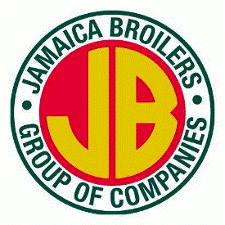
Jamaica Broilers
The financial year to April 2017 was a good one for Jamaica Broilers Group, with attractive revenue and profit growth. For the full year, profit after tax attributed to the company’s shareholders rose 28 percent to $2.23 billion from $1.74 billion in 2016.
Sales revenues grew 15.3 percent to $44.44 billion for the year from $38.52 billion in 2016. The group enjoyed a 17% increase in revenues in the fourth quarter to $12.32 billion up from $10.52 in 2016 but profit but rose from $900 million to $1 billion at a slower pace than the growth in revenue.
A fall in the pace of growth in gross profit was a major factor in the slower growth in the last quarter as direct cost rose limiting gross profit to a rise of 13 percent to $3.57 billion in the quarter from $3.16 billion in 2016.
Segment results showed the Jamaican segment generating revenues of $31.96 billion up from $28.4 billion but segment results fell from $3.6 billion to $2.87 billion. Revenues for the US based operations grew to $10.86 billion from 8.8 billion and generated segment profit of $1.3 billion compared to $1 billion in 2016. Other Caribbean Countries generated revenues from third parties of $1.6 billion up from $1.3 billion in 2016 and contributed $944 million to profit up from $254 million in 2016.
While some Jamaican companies are by passing cheap borrowed funds for expansion purposes, Jamaica Broilers with equity capital of $14.4 billion has $7.7 billion in debt. The group holds $2.76 billion in cash with loan receivable of $2.55 billion of which $500 million is due within 12 months. Cash flow from operations is attractive at approximately $3 billion for 2017. During the past year $749 million was expended on the acquisition of fixed assets compared to $800 million in 2016 and the group paid dividends of $420 million for the 2017 fiscal year, up from $311 million in the prior period.
Forecast for 2018 is for EPS of $2.60, up from $1.85 for 2017. The stock closed on the Jamaica Stock Exchange on Friday at $18 at 10 times 2017 earnings but 7 times 2018 earnings compared to an average of the main market of 13.7. IC Insider.com rates the stock a buy for growth and income.
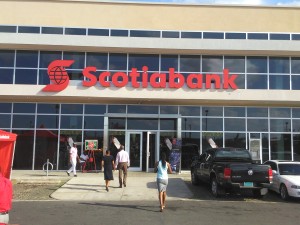
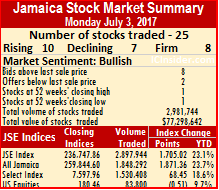 The main market ended trading with an average of 120,748 units valued at $3,117,741 for each security traded compared to an average of 66,606 units with an average value of $1,151,010 on Friday. The average volume and value for June ended at 218,951 units with an average value of $3,871,959.
The main market ended trading with an average of 120,748 units valued at $3,117,741 for each security traded compared to an average of 66,606 units with an average value of $1,151,010 on Friday. The average volume and value for June ended at 218,951 units with an average value of $3,871,959.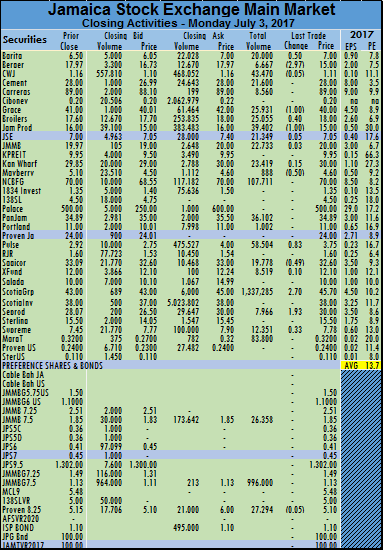 Mayberry Investments closed at $4.60, losing 50 cents with an exchange of 888 shares. NCB Financial Group closed at $70, after exchanging 107,711 shares, PanJam Investment closed at $34.89, with 36,102 shares changing hands, Portland JSX traded 1,002 units at $11, Pulse Investments closed at a new high of $3.75 after a 6 for 1 stock split, with 58,504 shares changing hands, Sagicor Group closed at $32.60, with a loss of 49 cents trading 19,778 shares, Sagicor Real Estate fund gained 10 cents to close at $12.10, with 8,519 shares changing owners. Scotia Group accounted for 46 percent of the volume traded in the market and the price jumped $2.70 to close at $45.70, with 1,337,205 shares having been traded, Seprod added $1.93 to close at $30 in exchanging 7,966 shares while Supreme Ventures closed at $7.78, with a rise of 33 cents with 12,351 shares changing hands. Proven Investments US ordinary shares closed at 23 US cents, with an exchange of 83,800 units, JMMB Group 7.5% preference share closed at $1.13, with 996,000 units exchanged, JMMB 7.5% preference share closed at $1.85, with 26,358 units traded and Proven 8.25% preference share lost 5 cents to close at a 52 weeks’ low of $5.10, with 27,294 units traded.
Mayberry Investments closed at $4.60, losing 50 cents with an exchange of 888 shares. NCB Financial Group closed at $70, after exchanging 107,711 shares, PanJam Investment closed at $34.89, with 36,102 shares changing hands, Portland JSX traded 1,002 units at $11, Pulse Investments closed at a new high of $3.75 after a 6 for 1 stock split, with 58,504 shares changing hands, Sagicor Group closed at $32.60, with a loss of 49 cents trading 19,778 shares, Sagicor Real Estate fund gained 10 cents to close at $12.10, with 8,519 shares changing owners. Scotia Group accounted for 46 percent of the volume traded in the market and the price jumped $2.70 to close at $45.70, with 1,337,205 shares having been traded, Seprod added $1.93 to close at $30 in exchanging 7,966 shares while Supreme Ventures closed at $7.78, with a rise of 33 cents with 12,351 shares changing hands. Proven Investments US ordinary shares closed at 23 US cents, with an exchange of 83,800 units, JMMB Group 7.5% preference share closed at $1.13, with 996,000 units exchanged, JMMB 7.5% preference share closed at $1.85, with 26,358 units traded and Proven 8.25% preference share lost 5 cents to close at a 52 weeks’ low of $5.10, with 27,294 units traded.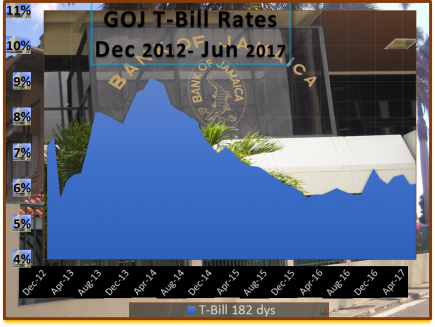 Bank of Jamaica is dropping the 30 day repo rate as its policy rate effective July 1st. According to the central bank, “its policy rate will be the interest rate that it pays on overnight deposits held by deposit‐taking institutions at Bank of Jamaica currently 3.75 per cent per annum.”
Bank of Jamaica is dropping the 30 day repo rate as its policy rate effective July 1st. According to the central bank, “its policy rate will be the interest rate that it pays on overnight deposits held by deposit‐taking institutions at Bank of Jamaica currently 3.75 per cent per annum.”  Berger Paints
Berger Paints 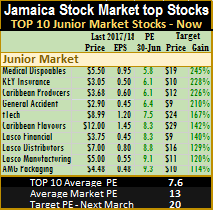 they have implemented a number of measures that is improving efficiency that will allow them to take on more business without the need to increase staff compliment for a while. They also pointed out that the sale team have been working to bring in new business and they expect increase business activity in the second half of the current year. Additionally, management took the recommendation about a possible stock split and informed the meeting that the board will discuss same.
they have implemented a number of measures that is improving efficiency that will allow them to take on more business without the need to increase staff compliment for a while. They also pointed out that the sale team have been working to bring in new business and they expect increase business activity in the second half of the current year. Additionally, management took the recommendation about a possible stock split and informed the meeting that the board will discuss same.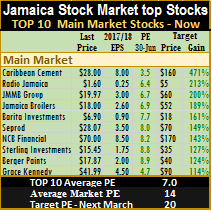 for the overall main market and 12.7 for Junior Market, based on 2017 estimated earnings. Several stocks are trading below these averages, and have potential for more gains in the months ahead, barring major negative developments.
for the overall main market and 12.7 for Junior Market, based on 2017 estimated earnings. Several stocks are trading below these averages, and have potential for more gains in the months ahead, barring major negative developments.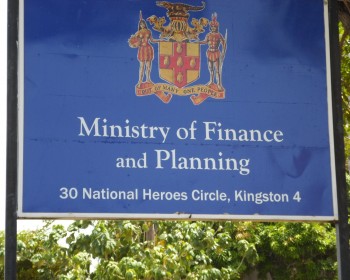 Government of Jamaica fiscal deficit dropped by $7.6 billion below budget to end at just $4.2 billion for the first two months of the 2017-18 fiscal year. Unbudgeted inflows of $5.2 billion and reduced expenditure of $1.9 billion versus budget were mostly responsible for the improvement.
Government of Jamaica fiscal deficit dropped by $7.6 billion below budget to end at just $4.2 billion for the first two months of the 2017-18 fiscal year. Unbudgeted inflows of $5.2 billion and reduced expenditure of $1.9 billion versus budget were mostly responsible for the improvement.


